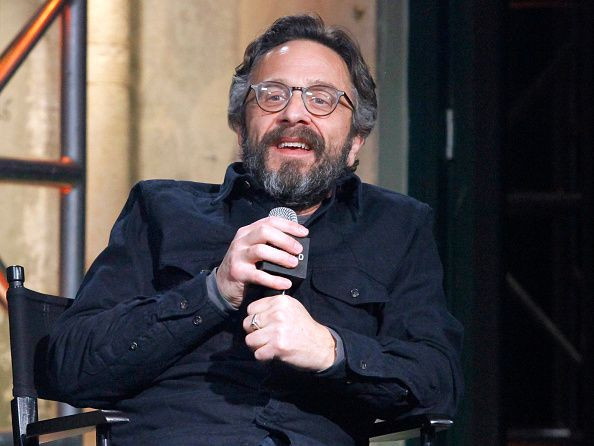Marc Maron Has A Standup Special, A Top Podcast, And A Hit Indie Sitcom. So Why Is He So Insecure?

Marc Maron shouldn’t have a lot to be insecure about. After spending years scrabbling up the sides of show business, the 52-year-old writer, radio host and comic has just had one of the best years of his professional life. In June, he welcomed President Barack Obama into his garage for a newsmaking interview; in November, IFC announced it was picking up a fourth season of "Maron," the half-hour sitcom he stars in; and Friday, “More Later,” his first hourlong standup special and the first TV special he’s done in 20 years, was set to premiere on the cable channel EPIX.
And yet for all that, there is a sense of restlessness about the man himself. It doesn't seem to be business-related. Last year, his podcast was reportedly earning north of $14,000 per episode, and certain episodes commanded more than that. Instead, it seems to be something Maron's had his entire life, and something that will continue to drive him.
International Business Times spoke with Maron by phone, with the actor in his kitchen in Los Angeles. The conversation has been condensed.
International Business Times: I want to start with the special. The running theme of the show is this nagging, running doubt and inner uncertainty, which strikes me as kind of crazy. You’ve just interviewed the president of the United States! Your show at IFC has been renewed for a fourth season! What do you have to be doubtful about?
Marc Maron: I don’t know. Is it doubtful or self-critical? For me, the voice that tells you you’re never doing enough, I don’t know if that voice is relative to reality. I think if you have that kind of mind or that kind of wiring that you never think you’re doing a good enough job or you’re not living up to expectation, I think it’s more that voice than self-doubt. I thought it was an aggressive, judgmental security. We do come together at the end, at least for a moment. I think that’s important in the narrative. There is sort of an arc to the show.
What that voice illustrates is my own discomfort with myself. Obviously I’m very grateful and sort of proud that something I had no expectations from has taken me as far as it has. I put my heart into it and it paid off at a time when I didn’t know that anything would. But you do get to that point where you’re like, "Well, what is the next thing?"

IBT: Speaking of next, what’s going on with the Vice show?
Maron: I’m not doing the Vice show anymore.
IBT: Oh. What ever happened to it?
Maron: I thought it was a very ambitious thing. It seemed like a good idea. Ultimately, because they had no real sense of when the network was going to launch; we were sort of floating. It’s really hard to book a show that doesn’t exist on a network that doesn’t exist. It was just a time window thing. We had a time window to achieve a certain number of shows and move toward something, and the window passed.
IBT: You do have this stable – or as stable as anything is in show business – position of being one of the preeminent people in your field. But it also seems like there are still things which have the ability to give you a huge lift. Did the POTUS show give you a lift in new listeners?
Maron: Sure it did. Absolutely. It’s interesting when you talk about show business, because I’ll be honest: even given whatever status I have within the world that I have it in, and that bleeds into the world of mainstream show business, I do still feel a little off the grid. I’m a bit showbiz-adjacent. Like I’m not necessarily part of the club. A lot of members of the club come by, they seem to like me, but they don’t invite me out much. You know what I mean?
That all speaks to the fact that the president’s episode, which is our biggest episode, has been downloaded 2.8, 2.9 million times. That’s a lot, you would think, but it’s not a huge number, relative to television.
I’m still relatively unknown. I’m still a very discoverable thing.
And you’d think, for someone who’s been in the business as long as I have and someone who’s done as much as I have in some ways, you’d think, “How can they not know me?” Well, they don’t. I’m discoverable, the podcast is discoverable, I hope this special is. I’m still relatively unknown. Every time something like the president happens, which is a once-in-a-lifetime thing, a lot of people go, “Who the hell is this guy?”
Not the president. Me.
IBT: In the years you’ve been doing this, you’ve interviewed a lot of big people. Is there anybody left on your bucket list?
Maron: Yeah sure. I still haven’t talked to Albert Brooks, and I don’t think he’s gonna talk to me.
IBT: Why wouldn’t he talk to you?
Maron: I don’t know. Some people just don’t like doing it. They’re intimidated by the lengthy one on one, or the nature of getting too personal. Or maybe he doesn’t feel like it. We’ve gone back and forth on Twitter, but I think he’s just jerking me around.
Lily Tomlin almost happened. I think that would be exciting. David O. Russell, I’d like to talk to. I’d like to explore some other areas as well, and I’m just trying to figure out how to do that. I’d like to figure out who I can talk to among painters and poets and physicists and stuff.
IBT: Physicists?
Maron: Yeah, I dunno. There’s gotta be entertaining physicists. There’s certain things I don’t understand. I think emotionally I’ve gotten sort of grounded in the type of conversations that I have, but there’s still a lot of things I’m curious about and don’t understand. I always wanted to understand philosophy. I never did. I don’t know how to read philosophy. There’s some part of me that wants to learn things on the mic.

IBT: Staying on the topic of the podcast, it seems like after spending years as a free, or ad-supported medium, podcasting is beginning to dip its toe into premium content that people pay subscriptions for. How do you feel about podcasting and where it’s going?
Maron: I don’t think anyone has specifics on that. I know where mine’s going. I know what probably will happen. It’s very exciting, man. I’m a guy who was fairly erratic and irresponsible and not really career-oriented, ever. I didn’t have a clear sense of how showbiz was going to make me a living. All I knew is that I wanted to become a great standup comic, and I felt sure that I would somehow be rewarded for that. I had no plan other than that. So for me, the fact that me and my business partner Brendan McDonald found ourselves at the cutting edge of this medium and make a living and just learned how to make a business, the fact that it’s sustained us and could sustain us singularly if we wanted that is pretty amazing.
It seems like it’s all heading toward a sort of on-demand universe, and platforms are vying for attention and eventually it’ll kind of level off. I don’t know how it will, really, but I like where it’s going. And I like the idea that anyone can try it. I do advise people to be wary of overnight success, if success at all. There is a certain magic that is unidentifiable in talent.
I’m fine with where it’s going because there seems to be a lot of choice on behalf of the podcaster and the creative person, which is what all creative people are looking for.
IBT: It’s interesting that you think of it as the Wild West, because I feel like it’s starting to become more buttoned up. They’re trending toward subscriptions, and Howl Premium, the subscription offering that Midroll unveiled earlier this year, used an ad-free version of your show as one of its main selling points.
Maron: It felt like a cool thing. [Earwolf co-founder] Jeff Ullrich is a fairly visionary guy in this world, in terms of creating Earwolf, creating Midroll, creating Howl. But the thing is, when we started, none of us really knew how to make money. It didn’t seem possible without closing gates and not being able to grow audience. As this business model started to evolve, and terrestrial started to die, and advertisers started to come over, how to capitalize on that became the question.
At the beginning, when I was doing ads, it was sort of, “Ugh, how many of these are we going to do?” But the truth of the matter is, if you work hard, and people have a relationship with you, and it’s relatively intimate, they’re going to understand if you want to make a living. They’re going to support you and the products you choose, or they’re going to fast-forward through the ads.
At the beginning, there were all these guys who said “Information should be free!” who pirated s---, but I don’t understand what that mindset really is. I don’t know if that’s really righteous.
IBT: But at the end of the day, this is about the relationship. You need that relationship. People are OK with paying because they value their time with you.
Maron: Yeah, but that’s old-timey s---. That’s beginning of show business stuff. That’s like old-time radio, dude. At the beginning, the only thing we really knew was that we were going to do a show Monday and Thursday, no matter what. That’s really the only commitment we made, was to be available, in a consistent way, so people could build a relationship with the show and with me. We knew that because me and Brendan were radio listeners and we worked within radio.
I think the kind of radio I do is kind of raw and personal and naked; it takes time. Not unlike any other relationship, I don’t know if people are going to like me. That’s the weird wild card in anything creative. You can spend your whole life doing something, but that doesn’t guarantee that people are going to engage or make it part of their life or celebrate it. That’s one of the great injustices of pursuing a creative life, is that it might not happen.
© Copyright IBTimes 2024. All rights reserved.



















